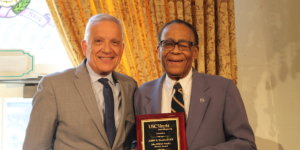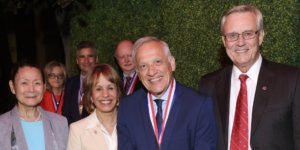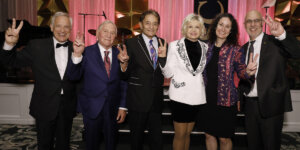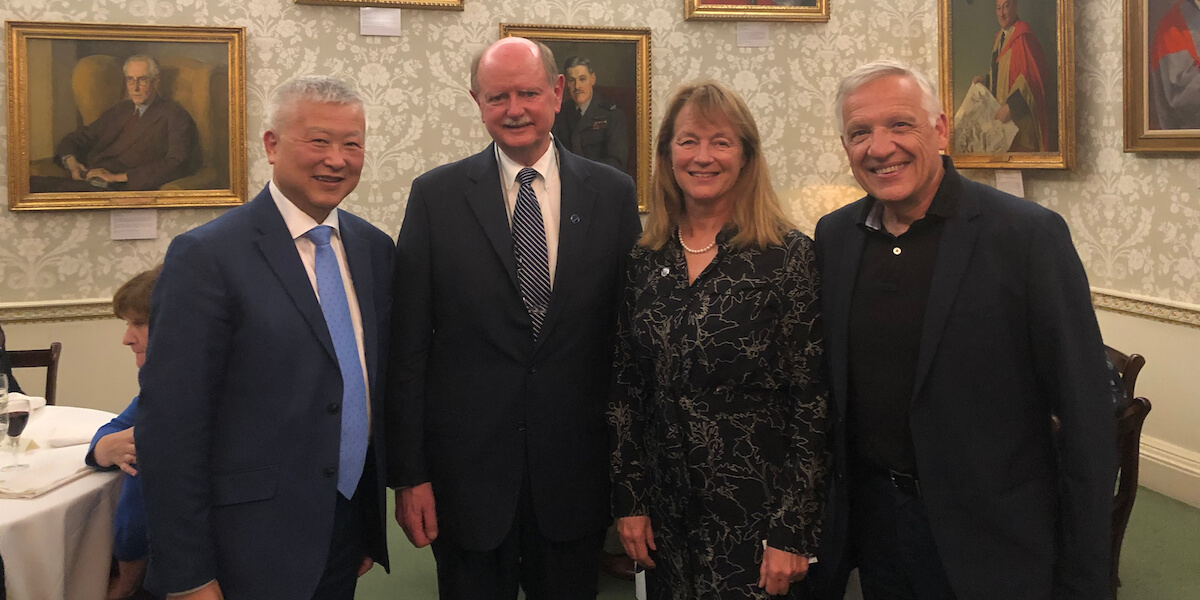
Imperial College President Alice Gast, B.S. ’80, hosts a select dinner in London for the Global Grand Challenges Summit. Attendees include (from left) USC Trustee Ming Hsieh, B.S. ’83, M.S. ’84; former USC faculty and now Olin College President Rick Miller; and USC Viterbi Dean Yannis Yortsos. All four are members of the National Academy of Engineering. (Photo/Courtesy of Yannis Yortsos)
In 2008, the National Academy of Engineering created a list of 14 goals for the 21st century, since then known as the NAE Grand Challenges. Since then, a number of initiatives have spawned in response, including the Grand Challenges Scholars Program, as well as a bi-annual Global Grand Challenges Summit, jointly held by the U.S. (NAE), the U.K. (RAE) and the Chinese (CAE) academies of engineering.
This year’s Global Grand Challenges Summit, the fourth in the series, was held in London, England. Dean Yannis C. Yortsos served for the fourth consecutive time on the steering committee for this event. An estimated crowd of 600, including about 300 students, attended the summit, which had the theme of “Engineering in an Unpredictable World.”
Princess Anne delivered the summit’s keynote address. USC Viterbi alumna and Imperial College President Alice Gast hosted an event on the eve of the Summit that honored representatives of the National Academy of Engineering, including USC Trustee and alumnus Ming Hsieh.
The origin of the Global Grand Challenges Summit dates back to early 2009, when Tom Katsouleas, then Duke University engineering dean and former USC electrical engineering professor and associate dean; Rick Miller, Olin President and former USC Viterbi associate dean; and Yortsos discussed holding a summit on the just announced National Academy of Engineering’s Grand Challenges for Engineering. In March 2009, the first summit took place in Durham, North Carolina. Just a year later, USC Viterbi hosted the next national NAE Grand Challenges Summit. At the inaugural summit at Duke, Yortsos called for the creation of a “Davos for Engineering” event – an international summit. It would take another four years for that idea to reach fruition.
The first Global Grand Challenges Summit took place in London in 2013 and included an on-site hackathon with about 50 students. Two years later, the second international summit took place in Beijing, which featured the introduction of the student business plan competition. In 2017, the third GGCS was held in Washington D.C., and this year the summit returned to London. USC Viterbi has played an important role in this global movement, which helps to change the conversation about engineering.
Following the Duke Summit, a Grand Challenges Scholars Program was announced at the 2009 Engineering Deans Institute, the annual deans’ meeting in Boston. Now adopted by more than 120 schools globally and growing fast, GCSP has become an NAE signature program. As of 2019, 163 USC Viterbi students have graduated with such a distinction, the most of any engineering school in the country.
The GCSP cultivates several mindsets, from interdisciplinary research and innovation to cultural understanding and service learning. “The GCSP is informed by the fact that fast evolving, convergent technology allows us to set now achievable goals for all humanity,” Yortsos said. “It helps grow many talented engineering students, students who will change the world.” Going forward the Grand Challenges Scholars Program could expand to other disciplines besides engineering and become university-wide.
At the Global Grand Challenges Summit in London, Marlink, an all-women, undergraduate USC Viterbi startup, was one of five teams representing the United States in the international student business plan competition. The team was selected as one of the five best U.S. student teams among more than 30 semifinalists. The competition also included five teams each from the United Kingdom and China. Professor Andrea Armani – Irani Chair of Chemical Engineering and Materials Science, Young Global Leader and two-time Young Scientist at the World Economic Forum – acted as the USC Viterbi team’s mentor.
Marlink is developing an underwater wireless communication technology that could allow greater exploration of the ocean at a lower cost than currently possible. This year’s team built on those experienced by earlier USC Viterbi student-led teams. In 2015, the health technology startup Stasis Labs won the silver medal at the Global Grand Challenges Summit in Beijing. Two years later, INTRAM, a USC Viterbi team that was building an app to improve post-stroke care, represented the U.S. at the Summit in Washington D.C.
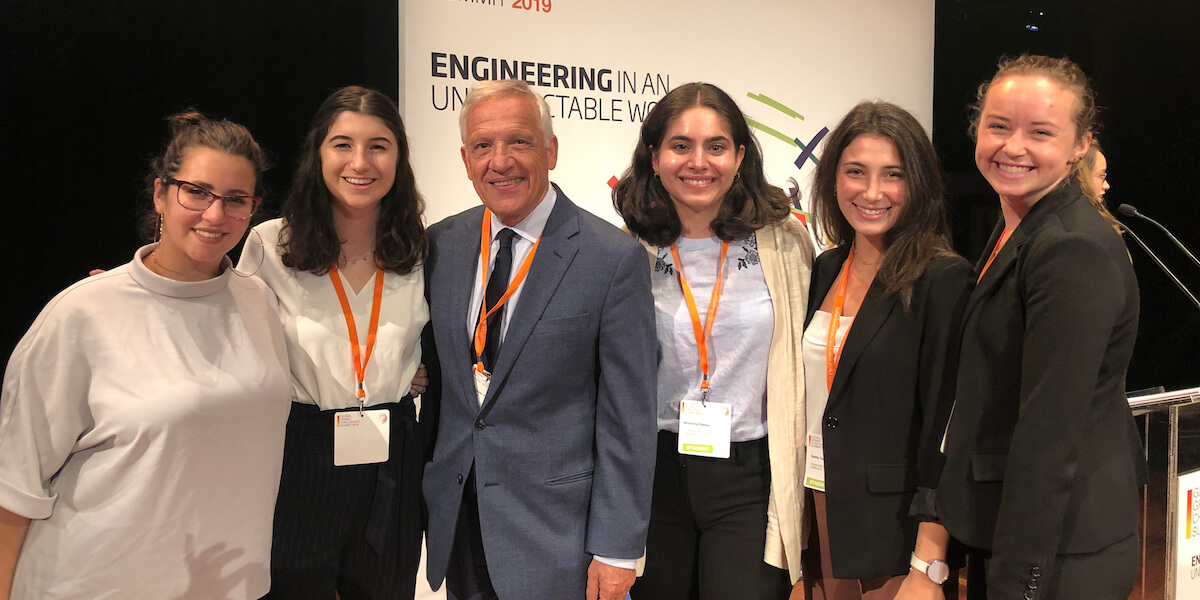
Dean Yannis Yortsos flanked by members of Marlink, a USC Viterbi team that participated in the Global Grand Challenges Summit international student business plan competition. (Photo/Courtesy of Yannis Yortsos)
The success of the London Global Grand Challenges Summit has set the framework for the next summit in the series, to be held in China in 2021.
Published on October 7th, 2019
Last updated on May 3rd, 2022




